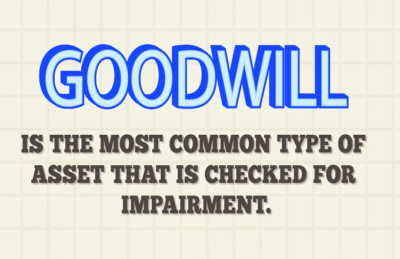Buying a Business
How much good luck is valuing business goodwill?

Let’s begin with “How much good luck is valuing business goodwill?”
It depends upon who is influencing you. There’s too much chatter among people who are wrong or don’t know enough about valuation. Or dealmaking. Or forecasting. Especially when it comes to goodwill’s helpful or adverse effects.
Here are some warnings, facts, tips, and strategies about valuing goodwill:
Thinking about buying a business?
You may not get what you think you’re buying!

Don’t conflate goodwill with good luck.
The IRS defines goodwill as the difference between the selling price of a business and the value of the tangible assets that buyers purchase.
Beware of goodwill, especially if its basis is the owner’s personal relationship with the company’s C.E.L.B.S. ™. To what degree can you reasonably expect to match or surpass the quality of the seller’s business relationships with the company’s customers, employees, landlord, bank, and suppliers?
Meaningful transitional assistance by the former owner for the buyer is especially important if the “value” of goodwill is a significant part of the purchase price. If the acquisition turns out to be a dumb deal, the company won’t have enough assets to generate enough money if the business is liquidated. And trying to seek recourse from the seller may be like squeezing blood from a turnip. The sad truth is too many buyers suffer lousy transitional assistance. Therefore, let’s, concentrate on goodwill instead of good luck.
Perspective: “In the final analysis, goodwill is based upon earning capacity. The presence of goodwill and its value, therefore, rests upon the excess of net earnings over and above a fair return on the net tangible assets.” IRS Revenue Ruling 59-60
Don’t assume the business has goodwill. When sellers cannot present buyers with a credible rationale for the value of the business’ goodwill, savvy buyers call it blue sky. Then the argument begins. Don’t let goodwill mask ill will.
Buyers may pay for goodwill if sellers demonstrate, because of the business’ commercial advantages and its unique competitive advantages, that it can generate a profit above a reasonable return on the business’ assets.
Factors to consider include its management, trade secrets, location, reputation, profit compared to its industry average, degree of barrier to entry, proprietary technology, and the quality of relationships with and the capabilities of its customers, employees, landlord, bank, suppliers.
Gaze at blue sky; don’t buy it.
According to one of the most renowned and longstanding business appraisers, Shannon Pratt, “If a sale actually goes through at an exaggerated price, it can boomerang against the seller in seller-financed transactions. Buyers who are overburdened with debt tend to default, dumping the company back on the seller’s lap. A large proportion of these are never paid off.”
Shannon Pratt continues: “Many brokers disregard the common-sense notion that cash flow should be net of reasonable owner compensation, and that cash flow should be adjusted to reflect any improvements or capital expenditures that will be needed in the future to maintain the current earnings stream.”
Brokers confuse goodwill with blue sky. Goodwill is supported by the historical earning capacity of the company. On the other hand, blue sky is projected future earnings based upon assumptions that are not supported by the company’s historical performance. Buyers will seldom pay for blue sky, but they will buy goodwill. The difference between the two is cash flow. American Business Group/Mid-market Merger & Acquisition Letter
If the seller’s or broker’s representations paint an exaggerated picture of the company’s future, and it turns out that the buyer relied on them in reaching his decision to purchase the company, there could be costly legal consequences. Robert Machiz, American Business Group
There’s something more important than tangible assets.
Tangible assets are important, but the value of a business is influenced more by its intangibles such as its sustainable competitive advantages and its goodwill.
Remember: Goodwill is the excess price you pay to buy a company greater than its fair market value.
Make a mistake valuing a tangible asset and you pay more than it’s worth.
Overvalue goodwill and you make a bad investment.
Don’t let goodwill mask ill will.
It’s good to buy a company with goodwill. But look for ill will, too. Negative experiences with the business, especially recent events, suffered by competitors, customers, employees, suppliers, sources of financing, governmental agencies or the landlord can generate anger and a desire for retribution. Gently probe for ill-will and rumors when you interview people who interact with the company.
Don’t let the seller drop the ball.
A business is “sold” in the owner’s mind before he sells it to you. His short-timer attitude can adversely affect the business. Watch for signs that the seller is slacking off, especially as it pertains to maintaining the goodwill of the business.
Encourage the seller to make one last effort, before he leaves, to strengthen the business’ relationship with its employees, customers, suppliers, landlord(s), and sources of financing. Similarly, discourage the seller from committing the company to material promises, obligations or changes to policies and procedures that significantly change the way the firm does business.
It’s wise for the buyer and seller to agree that neither one will issue a news release to announce the sale without the prior approval of the other (which won’t be unreasonably withheld). Appeal to the seller’s desire to do the right thing, which includes your self-interest. This may avert problems, and it will smooth your way into the business.
There’s more:
You can get a wider perspective pertaining to goodwill, plus several hundred other topics essential for evaluating and dealmaking, in my book: How to Buy the Right Business the Right Way—Dos, Don’ts & Profit Strategies.
Need help right now?
Schedule an hour of coaching with Ted Leverette, The Original Business Buyer Advocate ®
Not sure?
Watch this:
2-Minute Video Reveals What The Savviest Searchers Do
Preview my books:
120 Financial Lifelines for Small Businesses
How to Prepare Yourself and Find the Right Business to Buy
How to Buy the Right Business the Right Way—Dos, Don’ts & Profit Strategies
21st Century Entrepreneur Ideas for Kids and Aspirational Adults (Complimentary)
How to Get ALL the Money You Want For Your Business Without Stealing It (USA and Canadian versions.)
